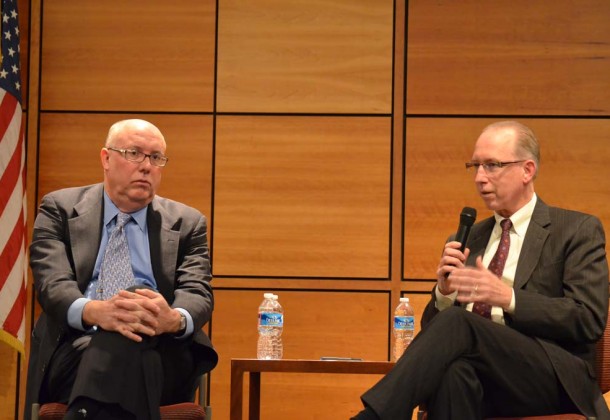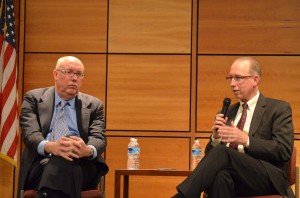Diffusing India and Pakistan Again – Not ‘If’ But ‘When’

Posted for The Patuxent Partnership and St. Mary’s College of Maryland
By Jay Friess

Bruce Riedel, left, answers questions with moderator Dr. Michael Cain after his speech at St. Mary’s College.
India and Pakistan are two of the world’s most populous nations and are both armed with nuclear weapons. They have been in conflict with each other over the territory of Kashmir since 1948 and have gone to war over it in 1965 and 1999.
And they will attempt to do it again, according to Bruce Riedel, former Deputy Assistant Secretary of Defense for the Near East and South Asia and now a senior fellow at the Saban Center for Middle East Policy.
Mr. Riedel spoke at St. Mary’s College of Maryland last week, at the invitation of The Patuxent Partnership and the college’s Center for the Study of Democracy, to promote his new book – America, India and Pakistan to the Brink and Back: Avoiding Armageddon in Asia.
“India and Pakistan today are among the most important countries in the world,” Riedel declared, but then noted. “For Americans, South Asia is the far side of the world.”
The region contains 65 cities that each have over 1 million inhabitants. Sixty percent of the population is under the age of 30. During this century, he predicted that 360 million Indians would escape poverty, and the country will soon grow bigger than China.
“India will have a youth pulse for the next 30 years,” he said. “[India] is changing faster and faster. … Every time India votes, it is the largest organized human activity in history.”
Pakistan, on the other hand, has the world’s fastest growing nuclear arsenal, Riedel said. It is the fifth largest in the world, trumping Britain.
By 2050, the country is projected to be the fourth largest in the world. But is is also highly unstable with 300 suicide bombings since 2001.
Both countries have sizable armies. India fields 1.3 million warfighters, and Pakistan has a standing force of 700,000.
Riedel advised President Bill Clinton during the 1999 Kargil Conflict in which Pakistan invaded the disputed territory of Kashmir and, after being repelled by the Indian Army, began mobilizing its nuclear weapons. At Clinton’s urging, Pakistani Prime Minister Nawaz Sharif withdrew Pakistani forces. “His decision to back down probably prevented a nuclear war in 1999,” Riedel said.
Riedel said that every American president since John F. Kennedy has been faced with diffusing an India/Pakistan crisis. He said that some scholars and politicians believe that we now know how to do it so well that is has become routine.
“I think that’s naive,” Mr. Riedel said. “I think we’re playing Russian roulette.”
What America can actually do to improve the situation is not clear. “We can make things worse, but there isn’t a whole lot of evidence that we can make things better.”
Mr. Riedel said he advised President Barack Obama to increase drone strikes against terrorists hiding in Pakistan. He said the campaign is not transparent enough and is the result of the United States not knowing what to do with captured terrorists.
“We couldn’t put boots on the ground,” Mr. Riedel said. “There needs to be a certain amount of candor and transparency. … We have to rely on the drones, because we’ve ruled out capturing terrorists.”
When asked what can be done to stabilize the region, Mr. Riedel said, “I don’t think there is one solution to the complex problem of Pakistan.” The first rule: “Do no harm. That’s where the drones have become a problem. We’ve become a little too drone addicted.”
It will ultimately be up to the people of India and Pakistan to make peace, Mr. Riedel said. And it will be up to Pakistan to transform itself from being “an army with a state, not a state with an army.”
“There’s a battle underway for the future of Pakistan,” Mr. Riedel said.























